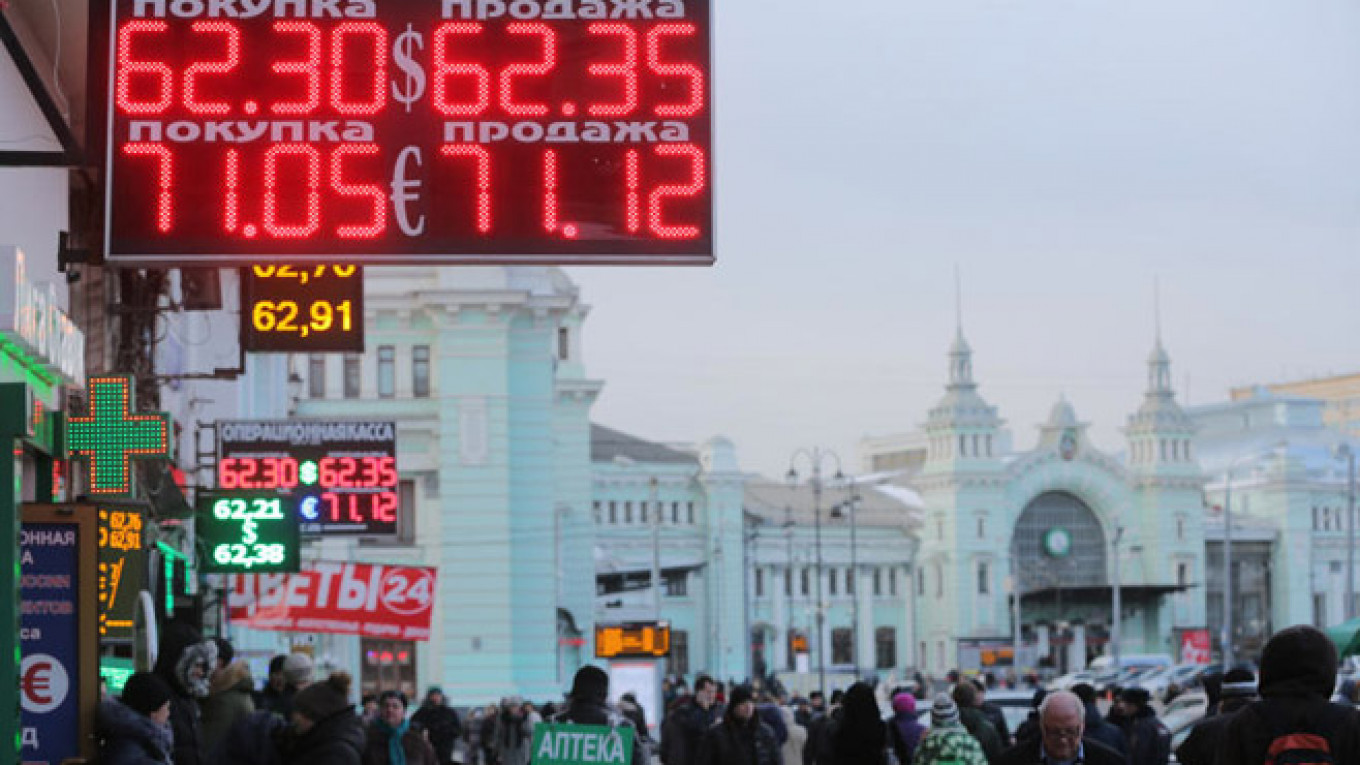Over the past four weeks the ruble's exchange rate against the U.S. dollar has recovered by over 12 percent to a rate of 60.5 at the end of last week. That move higher was prompted by the 16 percent recovery in the price of Brent crude over the same period and a swing toward greater optimism concerning the events in eastern Ukraine and, by extension, toward an easing of sanctions.
The big question is whether that optimism is justified, and may we see a continued rally in the oil price and the ruble exchange rate, or is this just a sucker punch ahead of fresh lows in both in the spring?
The first point to make is that anybody who says they know the definitive answer to that question is guessing. Unpredictable geopolitics play too big a role in both equations to be able to base a conclusion purely on economics.
There is also far too much noise in the oil market with commentators lining up to either confidently predict oil returning to $100 per barrel by the end of this year or to warn us that this is no more than a trading move. In market terms the noise is called "talking one's own book."
So, let's step inside a soundproofed court room, away from the chattering noise, and put ourselves in the place in a jury having to decide whether the case put forward by oil/ruble optimist, i.e. the plaintiff, or by oil pessimist, the defendant, has more merit.
The plaintiff's case for oil optimism is partly based on reports that the deployment of oil rigs in U.S. shale extraction sites has fallen and that should lead to a drop in U.S. oil output in the near future.
The argument also put forward points to the call from some OPEC countries for an emergency meeting to review production and help the price move higher. It is certainly no surprise that countries such as Nigeria, which had considerably boosted budget spending during 2010-13 when the oil price averaged $110 per barrel, are now feeling considerable financial pain. The third part of the argument is the assumption that demand will rise faster than expected because the global economy is showing signs of better growth.
The first of those points is clear enough. The total number of rigs used in shale oil production sites in the United States fell by another 37 last week and is now at the lowest level since July 2011. The defendant's counterargument is that when you look past the headlines, almost all of the rigs withdrawn since late last year are from exploration sites and marginal producing wells. There has been no reported withdrawal of rigs from established producing sites.
Using industry jargon, producers are now "high-grading," which essentially means focusing their efforts on maintaining existing oil flows and on expansion only in wells that are certain to produce more oil. It means that there is no reason to expect any cut in existing production from U.S. shale wells over the medium term.
The plaintiff's second argument is that OPEC may soon hold an emergency meeting and cut supply so as to force the price of crude higher. This is certainly the very public call from some member countries. The defense argument is that this is no more than had been expected and means nothing unless it is supported by Saudi Arabia or one of its close allies within OPEC. There is no evidence of that as yet.
Recall that one of the reasons for OPEC's refusal to cut production late last year, which was stated very clearly by the United Arab Emirates oil minister, is that the major producers within the organization have simply become frustrated by their loss of market share as non-OPEC production has risen so fast, and second, that any cuts should be shared pro-rata by non-OPEC states, and, especially, by all member states of the oil producing club.
Not doing anything to prevent an oil price collapse and waiting for the high-budget dependent and low financial reserve countries to start squealing was always part of the plan. That seems to be where we are now, though still some way off an agreement with OPEC to share the supply cut fairly. The defense argument is that that will come — but only in the autumn and after several more months of squeezing. The pain is hardly enough just yet.
The third argument, that demand will rise, is wishful thinking at best. The International Energy Agency now forecasts oil demand growth of 900,000 barrels per day this year, which is up from the 700,000 barrels of extra demand in 2014 but still lower than the long-run average growth of 1.3 million barrels.
As stated above, two-thirds of that extra demand is expected from U.S. shale producers, leaving little extra for OPEC unless other non-OPEC producers start to cut. Even in sanctions-hit Russia there is little evidence of that thus far.
The defense side will also point out that demand growth in China has slowed markedly from 500,000 barrels per day previously to only 200,000 barrels this year. Apart from the base effect, China's economic growth is slowing and there are more reasons to be worried about even slower growth than there are for a faster pickup this year.
When one weighs up the arguments between plaintiff and defense, it is difficult to see how the oil price rally can be sustained until there is an actual supply side response. The core of the argument right now is that either "there will be a supply side cut," or, perhaps, "there has to be a supply side cut." I believe that a jury would agree with that assumption but with the condition of "over time."
There really is no credible reason to assume a supply side cut from either non-OPEC or by the organization over the medium term. It means that while the current positive momentum can carry both oil and the ruble higher short-term, the price of both is still more likely to go much lower in the spring. Brent testing $50 per barrel and the ruble-dollar exchange rate pushing toward 70 are still much more likely in the second quarter than is $80 per barrel and 45 for the exchange rate.
The other complication when it comes to ruble forecasting is the assumption about sanctions. One of the reasons the ruble has rallied so strongly in February is because the oil price effect has been added to with sanctions optimism.
During January, when the price of oil rose by 2 percent, the ruble still lost 9 percent against the dollar because of concern that sanctions might be toughened. So while the ruble's exchange rate will fall in tandem with weaker oil, a recovery with a rising oil price also requires the optimism that sanctions, especially those affecting the financial sector, may at least start to be eased in the autumn.
Is the case put by the optimists proven or not? To accept it, one has to accept a number of very big assumptions concerning U.S. shale, internal OPEC agreement, China demand and also that the cease-fire in eastern Ukraine will hold and then lead to a settlement dialogue which might then see the start of the end of sanctions.
The verdict? Not proven but with permission to lodge an appeal in the late spring or early summer when more evidence may be available.
Chris Weafer is a senior partner with Macro Advisory, a consultancy advising macro hedge funds and foreign companies looking at investment opportunities in Russia.
A Message from The Moscow Times:
Dear readers,
We are facing unprecedented challenges. Russia's Prosecutor General's Office has designated The Moscow Times as an "undesirable" organization, criminalizing our work and putting our staff at risk of prosecution. This follows our earlier unjust labeling as a "foreign agent."
These actions are direct attempts to silence independent journalism in Russia. The authorities claim our work "discredits the decisions of the Russian leadership." We see things differently: we strive to provide accurate, unbiased reporting on Russia.
We, the journalists of The Moscow Times, refuse to be silenced. But to continue our work, we need your help.
Your support, no matter how small, makes a world of difference. If you can, please support us monthly starting from just $2. It's quick to set up, and every contribution makes a significant impact.
By supporting The Moscow Times, you're defending open, independent journalism in the face of repression. Thank you for standing with us.
Remind me later.








